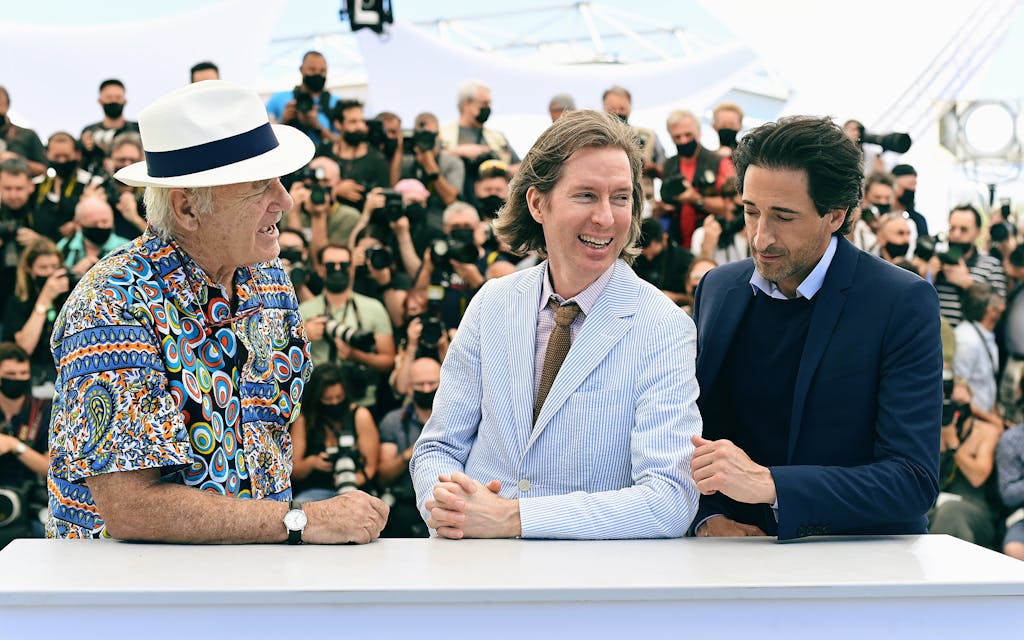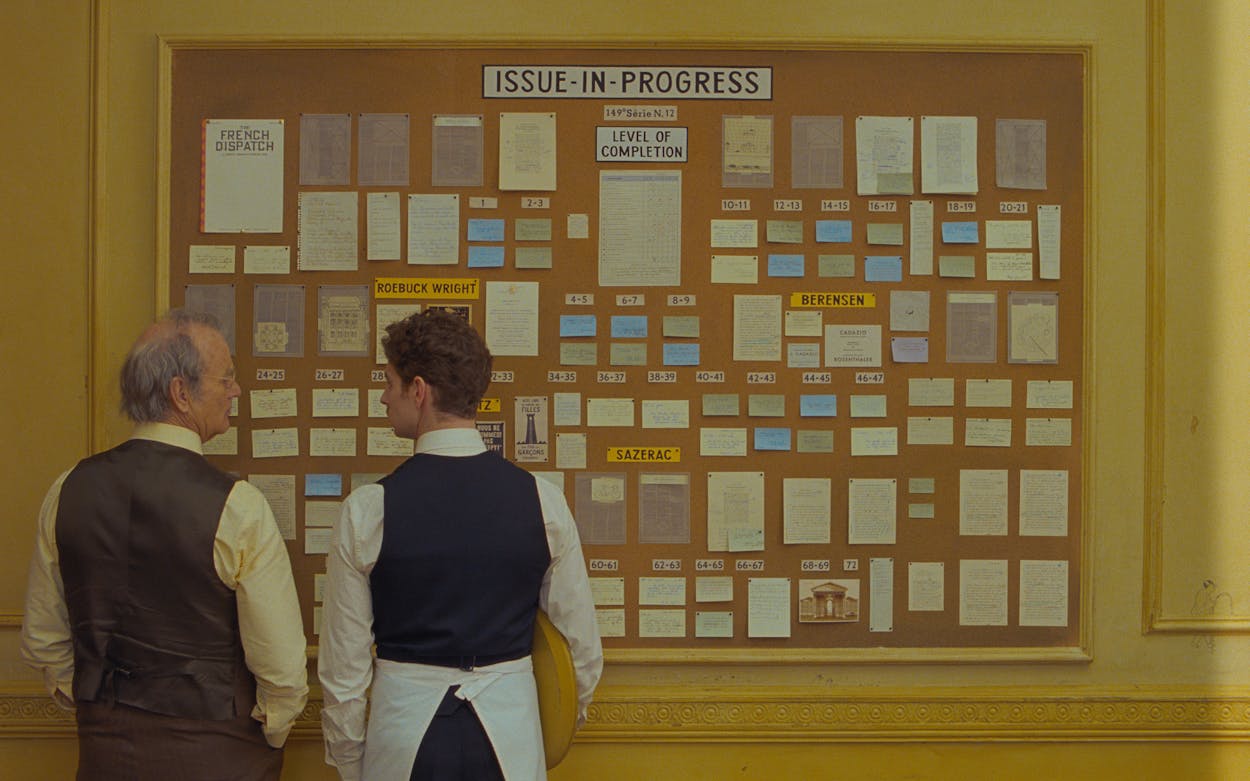Wes Anderson is the artfully centered toast of Cannes once again. The July 12 debut of the Houston native’s The French Dispatch became an instant sensation at the French festival’s seventy-fourth edition, earning rapturous applause, gushing reviews, and multiple column inches dedicated to star Timothée Chalamet’s shiny metallic suit.
For Anderson, it was an unusually delayed gratification: The French Dispatch wrapped production in March 2019, only to sit on the shelf throughout the COVID-19 pandemic. This whole time Anderson has held on to it, waiting until his film could have the kind of splashy European festival premiere that’s been his preferred milieu since The Darjeeling Limited.
Given that two-years-plus lapse—and the fact that you probably had other things to think about—it’s possible you’d forgotten all about a new Wes Anderson movie, right up until you started seeing pictures of Bill Murray working the red carpet in resort wear. For you we present a quick primer on everything we know about The French Dispatch and the impact it’s made already.
What are we talking about again?
The French Dispatch of the Liberty, Kansas Evening Sun (or The French Dispatch, as it will be called by everyone who’s not an insufferable pedant). It’s the latest from Houston filmmaker Wes Anderson, the writer-director who’s been celebrated as one of the modern era’s most distinctive auteurs.
Isn’t calling Wes Anderson a Houston filmmaker kind of a stretch?
Yeah, fair. Anderson lived in New York for most of his life, and he currently resides in Paris. Plus, his whole foppish, John Cheever–worshipping, corduroy-suited thing doesn’t exactly scream Houston. Still, he was “Texas’s own Wes Anderson” for the bulk of his formative years, even filming Bottle Rocket and Rushmore right here with his college pal and fellow Texan Owen Wilson—who, by the way, costars in The French Dispatch.
Owen Wilson, wow. Who else?
The film’s a veritable vintage picnic basket stuffed with Wes Anderson staples like Adrien Brody, Anjelica Huston, Edward Norton, Tilda Swinton, Willem Dafoe, Jason Schwartzman, and, of course, Bill Murray. There’s also Timothée Chalamet, Frances McDormand, Léa Seydoux, Jeffrey Wright, Liev Schreiber, Saoirse Ronan, Elisabeth Moss, Christoph Waltz, and Henry Winkler. Some of these are probably just glorified cameos, but they make for an impressive poster.
What about Bob Balaban?
You know it!
So what’s it about?
Touted as a “love letter to journalists” and set within the fictional French town of Ennui-sur-Blasé, The French Dispatch is a series of episodic vignettes all positioned as articles for the titular magazine. The film’s divided into “an obituary, a travel guide, and three feature articles,” evoking the experience of reading Anderson’s beloved The New Yorker from cover to cover, and celebrating the kind of eccentric, proudly literary writers therein. It’s about people! Sad, hyper-articulate, funny little people.
The overarching story is the “obituary” for the magazine’s publisher, played by Murray, whose death marks the impending end of his publication and inspires its staff of fellow American expats to reflect on some of the pieces they’ve filed over the decades. In one feature, Tilda Swinton’s art critic character profiles a genius painter, played by Benicio Del Toro, who also happens to be a murderer. In another, Jeffrey Wright plays a James Baldwin–esque food writer who recalls the time he became ensnared in a local kidnapping. The “travel” section is essentially Owen Wilson in a beret, tooling around town on a bicycle. And in what’s already destined to be the film’s centerpiece, Frances McDormand’s political reporter shadows a wild-haired student radical played by Timothée Chalamet, then winds up seducing him.
Wait, Frances McDormand has sex with Timothée Chalamet?
Yep! Fox Searchlight has even put out a teaser clip where McDormand surprises a naked Chalamet in the bath. Please enjoy this very specific fantasy.
What have the reviews been like?
Uniformly positive, bordering on rhapsodic. The French Dispatch currently boasts a 100 percent “Fresh” rating over at Rotten Tomatoes, thanks to reviews strewn with words like “wondrous,” “exquisite,” and “beguiling.” Inspired by the film painting journalists as soulful hero-poets, some have even taken the opportunity to wax lyrical about how much they liked it. Perhaps this fulsome appraisal from the Playlist’s Jessica Kiang best sums it up: “[It] is a work of such unparalleled Andersonian wit, that at times the sheer level of detail—mobile, static, graphic and typographic—that bedecked the screen was enough to make your correspondent’s jaw slacken.”
There have been a few doubters sprinkled in, with some, like Deadline’s Todd McCarthy, suggesting that Anderson sacrifices narrative coherence at the expense of “prostrating oneself on the altar of aestheticism for its own sake.” But even McCarthy means that as a compliment.

How did the Cannes audience react?
Also euphorically. Although Vulture’s Nate Jones swears he heard “a small smattering of boos,” any naysayers were quickly drowned out by the nine-minute standing ovation.
Nine minutes?! That seems excessive.
It is, though not unheard-of for Cannes—particularly at a premiere that probably felt like a huge release from a pent-up pandemic year we all spent deprived of any new movies or audience connection. Kyle Buchanan offers a more granular breakdown of the applause in the New York Times that helps to explain how it could have possibly gone on that long, while also chronicling Wes Anderson’s growing discomfort. But yes, nine minutes is a crazy long time to clap. You could listen to all of Bob Dylan’s “Hurricane” in nine minutes and still have thirty seconds to spare.
Well, it sounds like everybody had a nice time.
They did! According to Variety, the whole cast arrived in a giant gold party bus, then tumbled out to take photos of one another on the red carpet. Chalamet in particular really hammed it up with Swinton: leaning his head on her shoulder, holding hands with her as they walked down the theater aisle. During the standing ovation, he and Swinton also did a goofy pantomime with the name sign from Swinton’s seat—something no one would ever laugh at if it involved two non-famous people, yet it was deemed a hilarious “prank” by several giddy publications.
Even better, since Anderson declined to hold a press conference or do any interviews, they were all able to flee into the night the moment it was over.
Hmm. Doesn’t it seem … ironic that a movie lionizing journalists refused to do any press?
Yes, that is an astute observation. Very droll. Sounds like you’re the exact audience for this movie.
Actually, I find Wes Anderson’s style calculated and twee. Is there anything new here, or is this just another one of his whimsical little dollhouses?
Well, while it certainly sounds like Anderson relies on all his usual tricks, a few critics have also noted “the increasingly dark tones at the edges of Anderson’s Technicolor dream,” as Vulture’s Nate Jones puts it. There’s definitely some unusually dour subject matter—prisoners, protests, murder—even if it is handled with the director’s usual Fabergé egg touch. Plus, the film engages with politics and sex in a way Anderson hasn’t really touched on before. He’s also trying on new visual flair, experimenting with black and white, and animated sequences, etc. But yes, if you’re not predisposed to enjoy Anderson’s quirks, you probably already know you don’t want to see this.
Fair enough. When does it hit theaters?
October 22.
October 22?! And everybody’s talking about this now?
Did you miss the part about how we’ve been starved for new movies? The trades are already debating its Oscar chances. Better settle in.
- More About:
- Film & TV
- Film
- Wes Anderson






